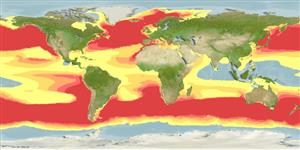>
Aulopiformes (Grinners) >
Paralepididae (Barracudinas)
Etymology: Arctozenus: Greek, arktos = bear + particle zen, derived from zao = to give life; risso: Named after A. Risso, European ichthyologist (Ref. 6885).
More on author: Bonaparte.
Environment: milieu / climate zone / depth range / distribution range
Écologie
marin bathypélagique; profondeur 0 - 2200 m (Ref. 50610). Deep-water; 71°N - 55°S, 180°W - 180°E
Worldwide distribution from the Arctic to Antarctic. Eastern Pacific: British Columbia (55°N) to at least north central Baja California (28°N) (Ref. 35950). Northwest Pacific: Bering Sea, Kamchatka, Kuril Islands (Ref. 41668).
Taille / Poids / Âge
Maturity: Lm ? range ? - ? cm
Max length : 30.0 cm SL mâle / non sexé; (Ref. 35388); common length : 25.0 cm SL mâle / non sexé; (Ref. 4473)
Épines dorsales (Total): 0; Rayons mous dorsaux (Total): 8-13; Épines anales 0; Rayons mous anaux: 28 - 34; Vertèbres: 72 - 86. Bright silvery in color (Ref. 6885). Branchiostegal rays: 8 (Ref. 35950).
Pseudoceanic and mesopelagic, occurring singly or in small schools (Ref. 5759), primarily at 200-1000 (Ref. 58302). Feed mainly on fishes and shrimps (Ref. 5759). Spawn in continental slopes and in oceanic banks from northern through tropical to southern temperate waters. Oviparous, with planktonic larvae (Ref. 35950).
Life cycle and mating behavior
Maturité | Reproduction | Frai | Œufs | Fécondité | Larves
Post, A., 1990. Paralepididae. p. 373-384. In J.C. Quero, J.C. Hureau, C. Karrer, A. Post and L. Saldanha (eds.) Check-list of the fishes of the eastern tropical Atlantic (CLOFETA). JNICT, Lisbon; SEI, Paris; and UNESCO, Paris. Vol. 1. (Ref. 4473)
Statut dans la liste rouge de l'IUCN (Ref. 130435)
Menace pour l'homme
Harmless
Utilisations par l'homme
Pêcheries: sans intérêt
Plus d'informations
RéférencesAquacultureProfil d'aquacultureSouchesGénétiqueElectrophoresesHéritabilitéPathologiesTraitementNutrientsMass conversion
Outils
Articles particuliers
Télécharger en XML
Sources Internet
Estimates based on models
Preferred temperature (Ref.
123201): 0.8 - 10.8, mean 4.1 °C (based on 2120 cells).
Phylogenetic diversity index (Ref.
82804): PD
50 = 1.0000 [Uniqueness, from 0.5 = low to 2.0 = high].
Bayesian length-weight: a=0.00224 (0.00090 - 0.00555), b=3.14 (2.92 - 3.36), in cm total length, based on LWR estimates for this (Sub)family-body shape (Ref.
93245).
Niveau trophique (Ref.
69278): 3.2 ±0.0 se; based on diet studies.
Fishing Vulnerability (Ref.
59153): Low to moderate vulnerability (27 of 100).
Nutrients (Ref.
124155): Calcium = 49.9 [16.8, 160.1] mg/100g; Iron = 0.548 [0.182, 1.750] mg/100g; Protein = 15.6 [12.5, 18.2] %; Omega3 = 0.105 [0.029, 0.325] g/100g; Selenium = 27.5 [7.9, 78.4] μg/100g; VitaminA = 14.2 [1.6, 119.9] μg/100g; Zinc = 0.615 [0.321, 1.262] mg/100g (wet weight);
